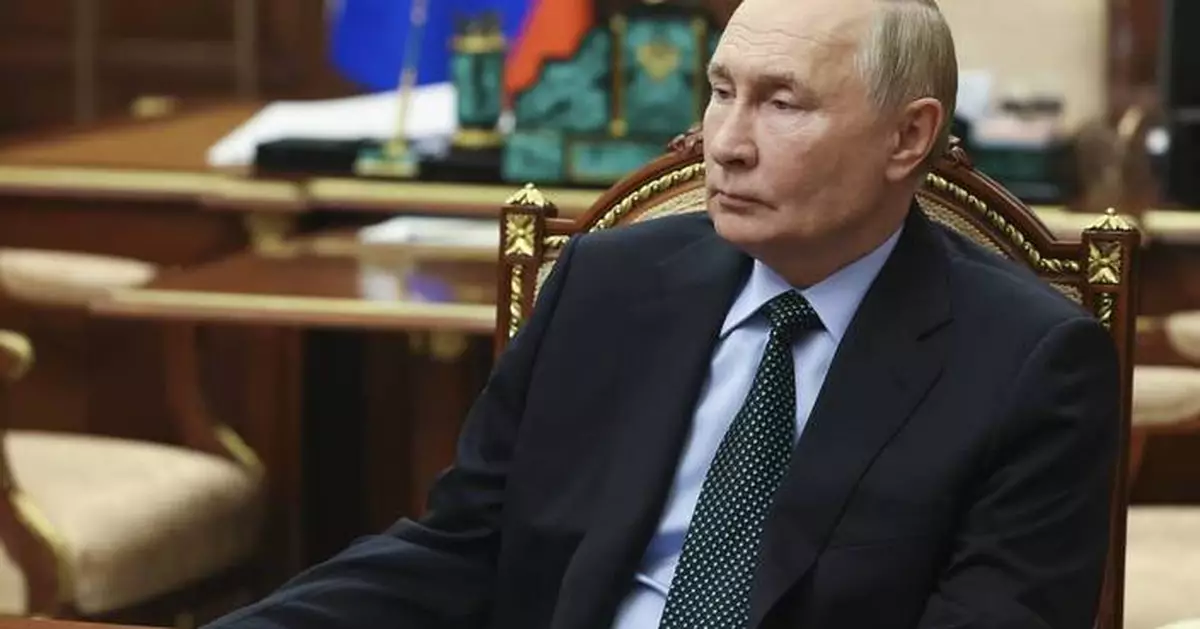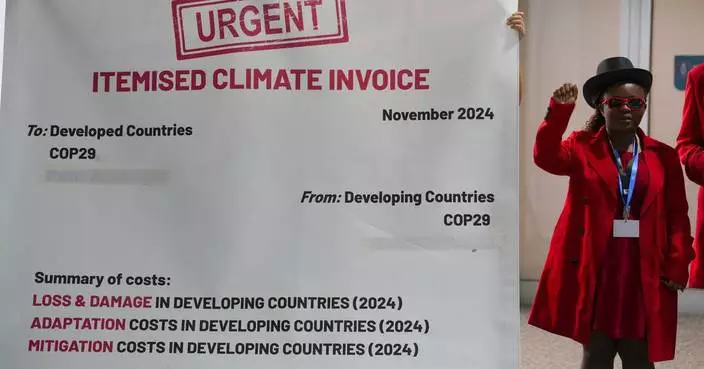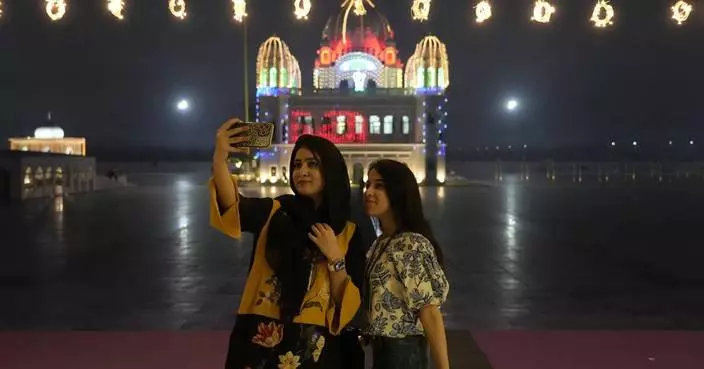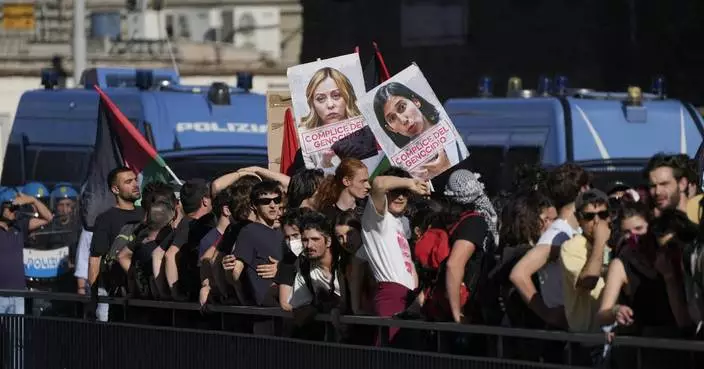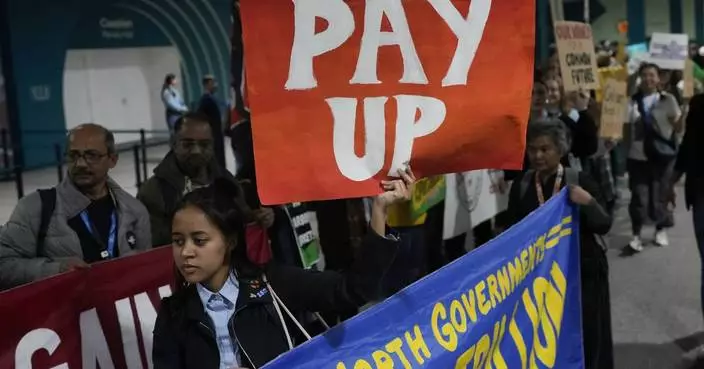President Vladimir Putin on Tuesday signed a revised nuclear doctrine declaring that a conventional attack on Russia by any nation that is supported by a nuclear power will be considered a joint attack on his country.
Putin’s endorsement of the new nuclear deterrent policy comes on the 1,000th day after he sent troops into Ukraine, on Feb. 24, 2022.
It follows U.S. President Joe Biden’s decision to let Ukraine strike targets inside Russia with U.S.-supplied longer-range missiles.
The signing of the doctrine, which says that any massive aerial attack on Russia could trigger a nuclear response, demonstrates Putin’s readiness to tap the country’s nuclear arsenal to force the West to back down as Moscow presses a slow-moving offensive in Ukraine.
Asked whether the updated doctrine was deliberately issued on the heels of Biden's decision, Kremlin spokesperson Dmitry Peskov said the document was published “in a timely manner” and that Putin instructed the government to update it earlier this year so that it is “in line with the current situation.”
Putin first announced changes in the nuclear doctrine in September, when he chaired a meeting discussing the proposed revisions.
Russia's president has previously warned the U.S. and other NATO allies that allowing Ukraine to use Western-supplied longer-range weapons to hit Russian territory would mean that Russia and NATO are at war.
The updated doctrine states that an attack against Russia by a nonnuclear power with the “participation or support of a nuclear power” will be seen as their “joint attack on the Russian Federation.”
It adds that Russia could use nuclear weapons in response to a nuclear strike or a conventional attack posing a “critical threat to sovereignty and territorial integrity” of Russia and its ally Belarus, a vague formulation that leaves broad room for interpretation.
It does not specify whether such an attack would necessarily trigger a nuclear response. It mentions the “uncertainty of scale, time and place of possible use of nuclear deterrent” among the key principles of the nuclear deterrence.
The document also notes that an aggression against Russia by a member of a military bloc or coalition is viewed as "an aggression by the entire bloc," a clear reference to NATO.
At the same time, it spells out conditions for using nuclear weapons in greater detail compared with previous versions of the doctrine, noting they could be used in case of a massive air attack involving ballistic and cruise missiles, aircraft, drones and other flying vehicles.
The wide formulation appears to significantly broaden the triggers for possible nuclear weapons use compared with the previous version of the document, which stated that Russia could tap its atomic arsenal if case of an attack with ballistic missiles.
President Alexander Lukashenko, who has ruled Belarus with an iron hand for more than 30 years and has relied on Russian subsidies and support, has allowed Russia to use his country’s territory to send troops into Ukraine and to deploy some of its tactical nuclear weapons.
Since Putin sent troops into Ukraine, he and other Russian voices have frequently threatened the West with Russia’s nuclear arsenal to discourage it from ramping up support for Kyiv.
Russian hawks have been calling for toughening the doctrine for months, arguing that the previous version failed to deter the West from increasing its aid to Ukraine and created the impression that Moscow would not resort to nuclear weapons.
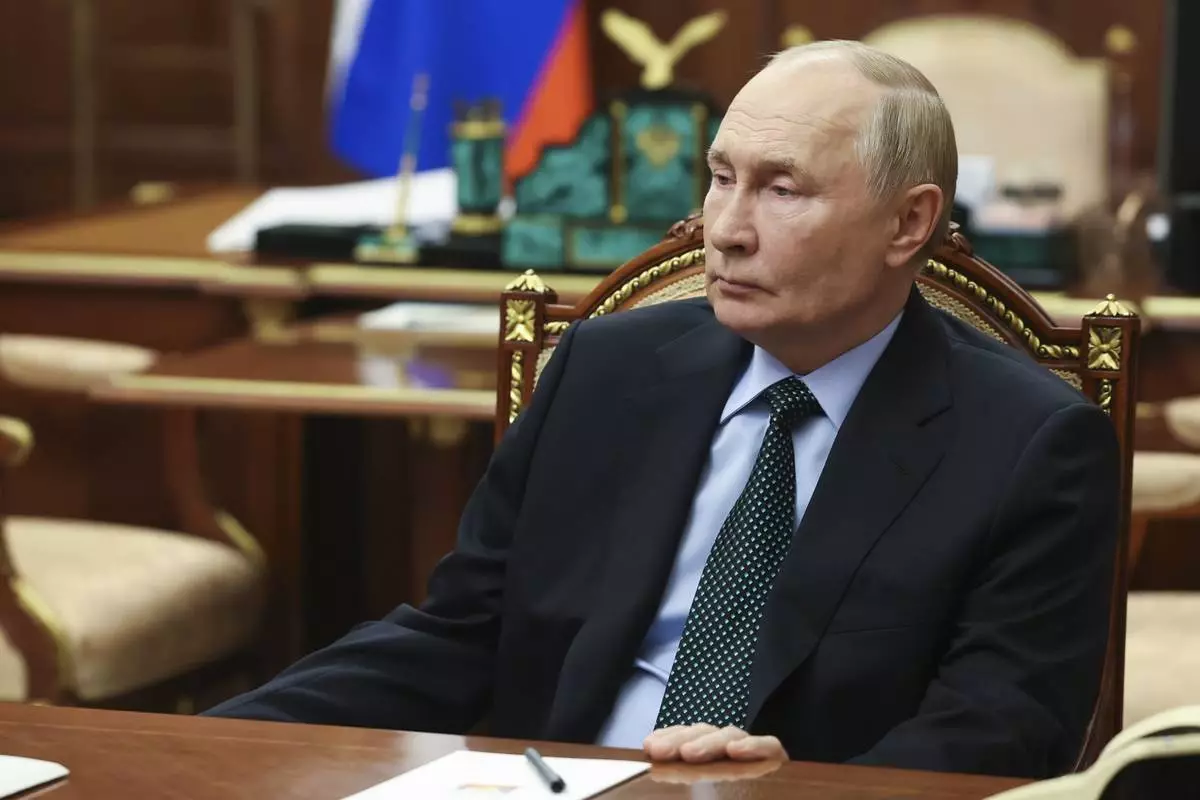
Russian President Vladimir Putin listens to Moscow-appointed head of Russian-controlled Zaporizhzhia region of Ukraine, Yevgeny Balitsky during their meeting at the Kremlin in Moscow, Russia, Monday, Nov. 18, 2024. (Vyacheslav Prokofyev, Sputnik, Kremlin Pool Photo via AP)
HONG KONG (AP) — Forty-five prominent activists in Hong Kong were sentenced to jail for up to 10 years on Tuesday, sparking criticism from foreign governments and rights groups, but Beijing defended the decisions.
The democracy advocates were among 47 people charged under a Beijing-imposed national security law in 2021 for their involvement in an unofficial primary election to pick opposition candidates. In the city's biggest national security case to date, they were accused of agreeing to veto government-proposed budgets indiscriminately after potentially securing a legislative majority to force a dissolution of the legislature and then the ouster of the city’s leader.
The case involved pro-democracy figures across the spectrum. Thirty-one of them pleaded guilty to the charge of conspiracy to commit subversion. Fourteen others were convicted following a long trial. Two were acquitted.
Australian Foreign Minister Penny Wong said her government was “gravely concerned” by the sentences for Australian citizen Gordon Ng and the other activists. Wong said Australia has expressed strong objections to the Chinese and Hong Kong authorities over the continuing broad application of national security legislation.
Chinese Foreign Ministry spokesperson Lin Jian said no one should be allowed to use democracy as a pretext to engage in unlawful activities and escape justice. Lin said certain Western countries ignored the fact that they maintain their own national security through judicial procedures while unreasonably criticizing Hong Kong courts for "fairly implementing" the security law.
“This severely violates and tramples on the spirit of the rule of law,” he said at a news briefing.
He said Beijing firmly opposes what he described as certain Western countries' interference in China's internal affairs and their attempts to smear Hong Kong's rule of law.
The European Union called the sentencing “another unprecedented blow” against the city's fundamental freedoms, democratic participation and pluralism.
It said in a statement that it is deeply concerned about the politically motivated prosecution of the defendants for peaceful political activity. It said such activities should be legitimate in any political system that respects basic democratic principles.
Hong Kong Security Minister Chris Tang said the sentences reflected the severity of the offenses. Tang said national security helps safeguard the city's prosperity, so his government takes any violations of the law seriously.
“Different people may have different judgments about whether the sentencing is appropriate. But I think the important point is the rule of law," he said in a news briefing.
Taiwan presidential office spokesperson Karen Kuo said democracy is not a crime and condemned the Chinese government for using what she called unjust procedures to suppress the political participation and freedom of speech of Hong Kong pro-democracy figures.
The sentencing "not only breaks the promises of ‘50 years unchanged’ and ‘high degree of autonomy,’ but further proves that ‘one country, two systems’ is unfeasible," she said in a statement.
When Hong Kong returned from British to Chinese rule in 1997, Beijing promised to retain its Western-style civil liberties for 50 years under the governing principle of “one country, two systems.”
The U.S. Consulate in Hong Kong said the U.S. strongly condemned the sentences, saying the defendants were aggressively prosecuted and jailed for participating in normal political activity protected under the city's mini-constitution.
“We call on (Beijing) and Hong Kong authorities to cease politically motivated prosecutions of Hong Kong citizens and to immediately release all political prisoners and individuals jailed for their peaceful advocacy for rights and freedoms,” it said in a statement.
Hong Kong's last British governor, Chris Patten, said the sentencing was “not only an affront to the people of Hong Kong, but those who value rights and freedoms around the world" in a statement.
He condemned the “sham” sentences, calling on the British government not to allow the results of the case to go unnoticed. He said the activists were an integral part of the city's pro-democracy movement.
Amnesty International China director Sarah Brooks said the people convicted in the "politically motivated" case should not spend even a day in jail.
“None of the 45 people sentenced have committed an internationally recognized crime; they have been jailed only for exercising their human rights,” she said.
Maya Wang, associate China director at Human Rights Watch, said, “Running in an election and trying to win it is now a crime that can lead to a decade in prison in Hong Kong.”
Wang said the harsh sentences reflect how fast Hong Kong's civil liberties and judicial independence have nosedived in the past four years since the security law was introduced.
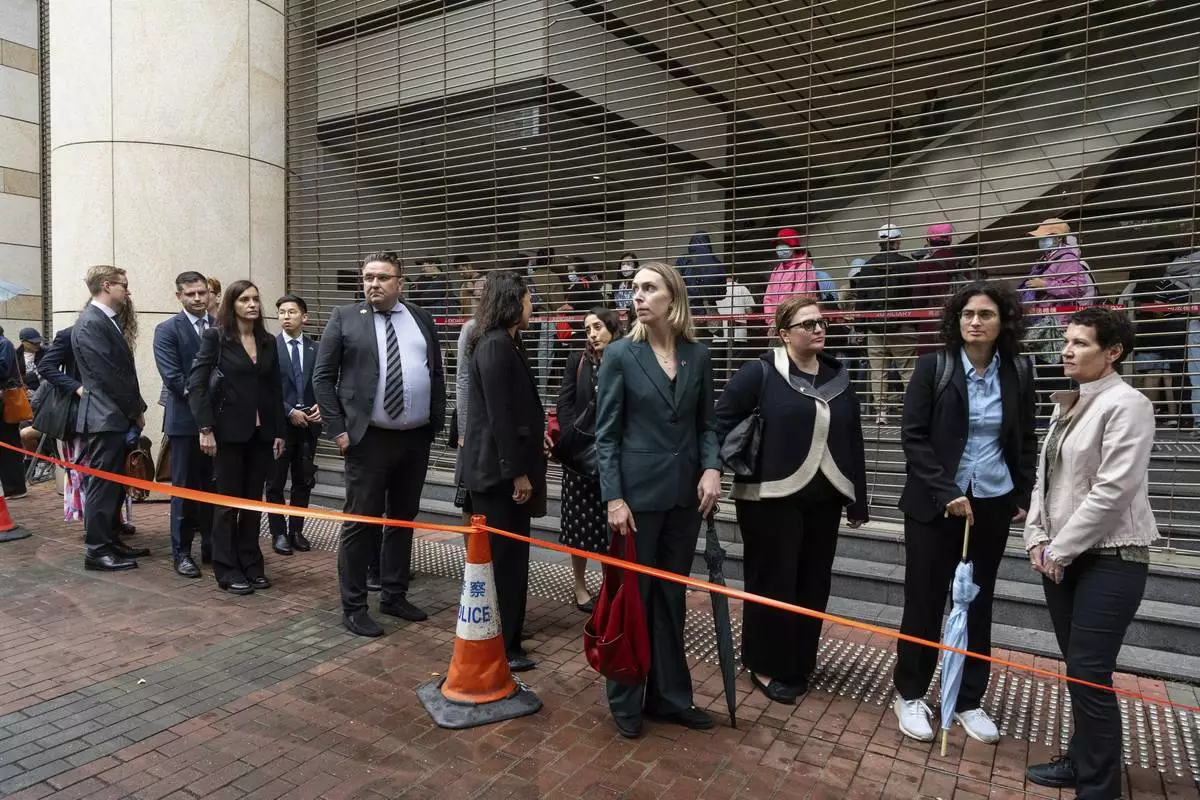
Representatives from various consulates wait in line outside the West Kowloon Magistrates' Courts in Hong Kong Tuesday, Nov. 19, 2024, ahead of the sentencing in national security case. (AP Photo/Chan Long Hei)
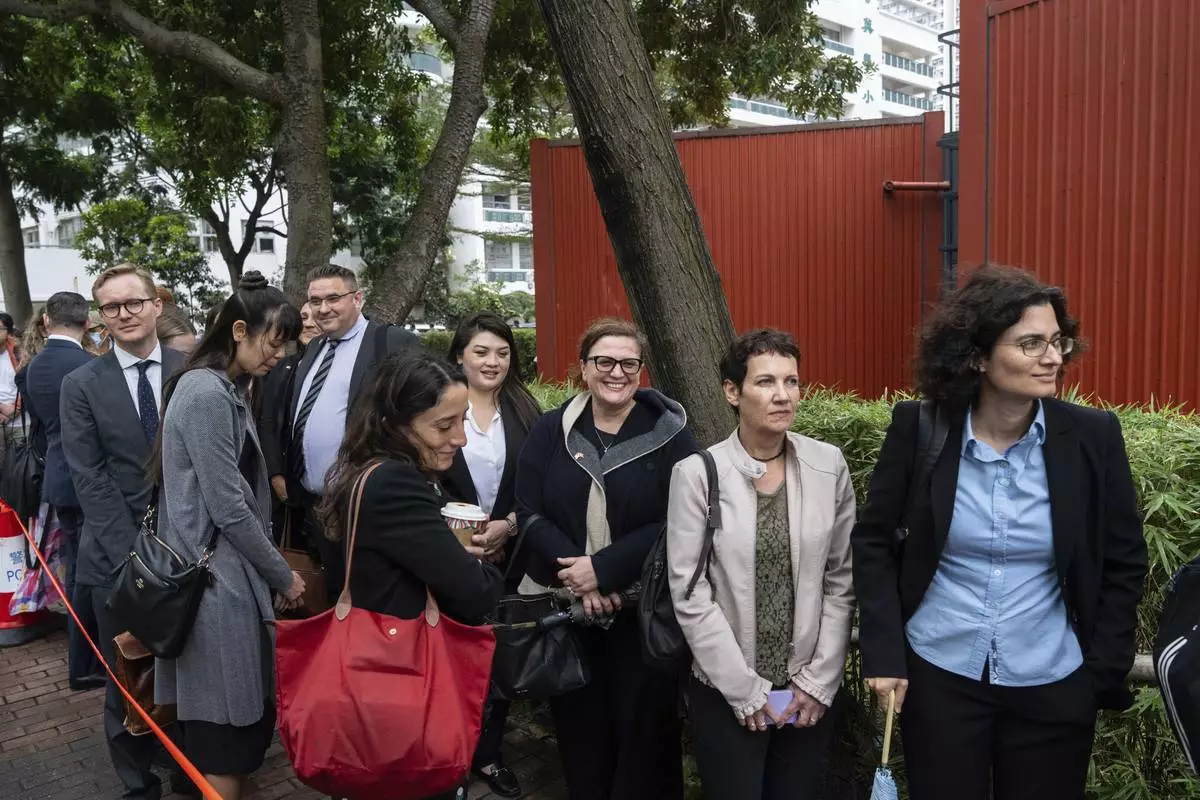
Representatives from various consulates wait in line outside the West Kowloon Magistrates' Courts in Hong Kong Tuesday, Nov. 19, 2024, ahead of the sentencing in national security case. (AP Photo/Chan Long Hei)



